
Starting a Video Production Company?
I talk about how to start a video production company, things to avoid and 4 mistakes I made.
VIDEO PRODUCTION COMPANYBUSINESS TIPS
Ben Illingsworth
6/8/20239 min read
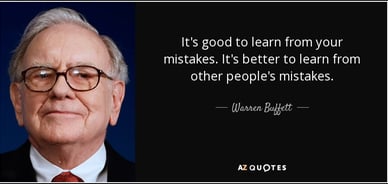

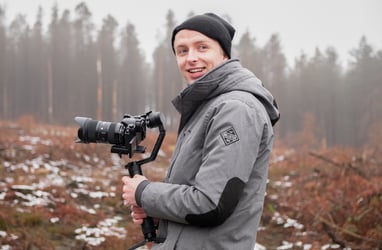


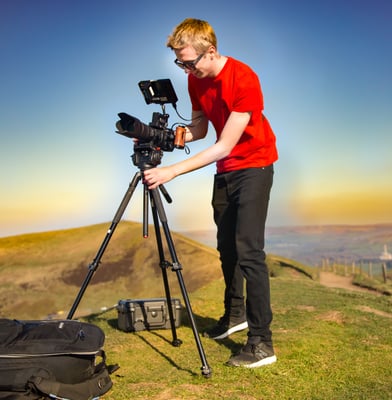





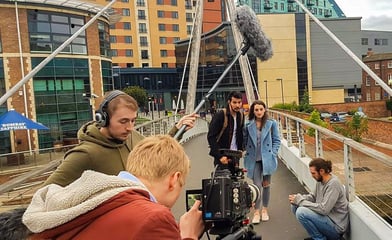

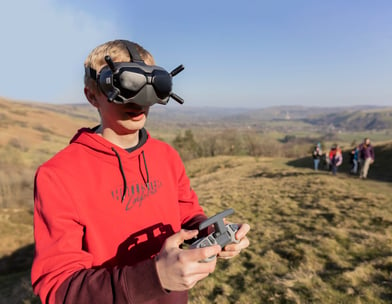



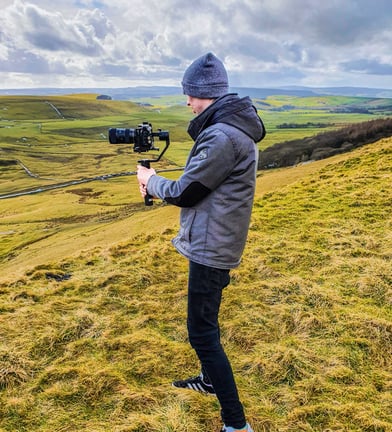











Introduction
At the bottom of this blog post please see my Podcast Episode on Business Unlimited!
We all make mistakes as Warren Buffet says, It is good to learn from your mistakes. "It's better to learn from other people's mistakes."
In this blog I discuss 4 things that early on in my career I have struggled with and by discussing them I feel it can help and benefit other people wanting to improve themselves and gain more knowledge.
All of these things come from life experience, which I am still gaining.
1) Learning The business side and having multiple sources of Income
Let’s be honest, we would rather be glorified camera nerds worrying about camera specs, lenses, filters and aspect ratios, but you are actually a business owner or a freelancer and you have to know how to operate in a profitable way.
This is not something that can be learnt easily and it comes from experience. Below I have listed some books I recommend.
· The 80/20 Principle: The Secret of Achieving More with Less by Richard Koch
· The E-Myth Revisited: Why Most Small Businesses Don't Work and What to Do about It by Michael E. Gerber
· Disrupt You!: Master Personal Transformation, Seize Opportunity, and Thrive in the Era of Endless Innovation by Jay Samit
· Launch: An Internet Millionaire's Secret Formula to Sell Almost Anything Online, Build a Business You Love, and Live the Life of Your Dream by Jeff Walker
· Rich Dad's Cashflow Quadrant: Guide to Financial Freedom by Robert T. Kiyosaki
When starting out as a freelancer or limited company, having a business bank account is also something I suggest. I personally use Starling bank as in one click you can see your expenses in a graph which helps to keep track of your finances and makes things simple when submitting to HMRC (For Filling Tax Returns). For invoicing I use an app called Invoice Temple which allows you to create free custom professional invoices with logos from your phone with ease.
Always get a good accountant and outsource what you can as this will save you time and stress! You need to find an area or a few areas to specialize in as you can charge more for your service and not be seen as a jack of all trades. It is okay to dip into other sectors as to diversify your income. Our main focus is in live sport and TV production providing drone services and also sometimes working as a Director of Photography (DOP),camera operator or assisting on bigger programmes. If you have a regular client try and tie them down to a retainer contract, giving them a discount. The main benefit for you is that you can have a regular work agreement which provides a regular income stream. Always take a deposit and have this in your contract.
Always have a contract, which details the agreements and terms . Discuss with a solicitor what contract is appropriate for your business.
As you are probably aware the COVID-19 Pandemic has caused mass problems for many filmmakers. Most filmmakers and everyday people rely on one source of income, around 4 in 10 people live pay check to pay check.
Full Time Filmmaker founded by Parker Walbeck is a great example of a pandemic proof income source which is an online film school, teaching filmmakers how to shoot professional videos and run a business. It generates around $3 million a year which is amazing, but the course isn’t completely passive, as it gets updated with new content regularly.
In most cases filmmakers main income source is from client-based projects and with many businesses closed currently this is proving to be an unreliable income source.
I’m currently working to develop these passive income sources.
· Stock Footage/ Stock Video
· Footage Licensing (Mainly Drone)
· YouTube and Sponsored Content
Other Sources Include
· Selling Online Courses and Coaching
· Books
· Digital Products (Video Assets, Graphics and Business Documents)
· Physical Products
· Assets like Gold, Silver and investing in the SMP 500 are good 'Long Term Investments'
For anyone looking at go full time freelance I would suggest that you look to build some passive income sources so that in the event of work drying up you can still pay your bills. Building these income sources does not happen over night and in a lot of cases it can take years.
2) Equipment buying
We can all argue that buying the latest camera can be an amazing feeling and can provide instant gratification.
Equipment can often be considered to be more of a liability especially if you are buying an expensive camera which will depreciate in value in very much the same way as an expensive car will lose around 20% of its value when driven off the lot. This is very much the same when unboxing a new camera.
In the beginning at times, I had a slight obsession with trying to own every piece of equipment and I soon understood that this is not financially viable, you should never go into debt buying equipment unless you have pencilled in work and have evidence that you can pay it back. One thing to bear in mind is that until the money is in your account and you have completed the job, the money is not yours and anything can happen, the client can change their mind and the project can fall through.
Renting equipment should always be considered as a option and if the client can’t afford to pay for the rental of that piece of kit then it wasn’t worth worrying about in the first place. You should not do any work if a client doesn’t factor in your equipment cost as they are effectively hiring in your equipment and your services.
When buying new equipment, you should follow the 7-day rule to avoid impulse buying. If you give yourself 7 days to think over the purchase most of the time you will realise that actually, it probably isn’t a good idea to buy that piece of equipment. The practicality and portability of an item should be considered when purchasing something as it might seem cool in practise but if the setup time is long and it takes numerous crew members to operate the equipment it might not be a good option.
I think that you should only buy equipment if it can make you money which is one of the reasons I delayed the instant gratification of buying a drone until I could afford to complete the training and obtain the commercial drone license. I was fortunate as well that drones had dropped significantly in price by then to a point where I could get a rarely used drone with all the accessories I needed.
Renting out your equipment can be one way of getting some of the money back from your equipment purchase. I use a service called Fat llama. My tips for using Fat Llama is take video and photo proof of the items condition before the item’s rental in case of an insurance claim and if the person doesn’t want to use the platform you insist they do to protect yourself.
3) Not Showing Confidence Straight Away
I've definitely had a few knock backs in my career and in my life where people haven’t been the kindest to myself, but confident people don’t listen to criticism which isn’t justified, if you are professional and hard working then peoples opinions about yourself shouldn't matter. If you do not show confidence in yourself, nobody else will it, is as simple as that.
There is a good English saying is ‘Fake it until you make it’ which is absolutely true and it suggests you need to mask and show confidence even if you might not have it just yet. Confidence makes you look capable and strong and be able to handle tasks independently.
Ultimately you can’t control other people, but you can control your own actions and your actions influence other people’s behaviour around yourself.
I really do believe that having the technical skills and knowledge is only 50% of the equation, as the other 50% revolves around your network and your skills to be able to communicate your ideas.
A really good book I recommend is ‘How to Win Friends and Influence People by Dale Carnegie’ .This book talks about how to develop your communication, confidence skills and how to influence people into your way of thinking. To summarise the book helps you to get people into your way of thinking. You need to talk of their interests and needs to solve their problems and in return that person will be much more likely to help you.
4) Charging Low Rates/ Lack of Structure
In the beginning I completely understand that charging industry standard rates can be difficult when you don’t have the experience, portfolio or contacts. So you might have to charge less or work for free in the beginning, but this should only be viewed as a quick short term fix! For more information on rates for runners, camera operators and theatre workers etc I have linked some information from BECTU.
https://bectu.org.uk/get-involved/ratecards/
Once you have an idea of your rates, be firm and stick to your price. There are a few reasons for this .
If you lower your rate it shifts the power dynamic and it makes the client feel they have won and they may question if the reduced rate is the lowest rate.
In this industry people are well connected and people talk so it might cause upset if someone got a different price to someone else for the same service and if might suggest to someone there is favouritism.
When negotiating with a client if they say no to your price or proposal you should not give in and you should try to investigate it and get to the bottom of what the problem is. It could be a detail or a issue with pricing, in which I suggest opposed to lowering the price or offering a discount you could maybe look at removing a service which is the least beneficial one.
My Main Advice
My advice is to avoid unpaid voluntary placements/ internships as they often don't put your needs first and don't let you focus on the area of production you want to go in to in the beginning. You have to make things happen for yourself and you don't have to seek the approval of others or wait for others to help. Everybody in the industry is busy so sometimes when you don't hear back from someone you shouldn't take it too personally (Leads don't get back to me all the time). Never be afraid to pickup the phone to follow up about an enquiry as it could make the difference between getting the job or not.
Film equipment now is becoming much more affordable and and you can create high quality work on your own or in a small team of friends where you can have fun and experiment. I shot parts of Big Cook Little Cook by myself in my home town of Barnsley and the FPV parts with my friend. This shows that there are opportunities out there and can be done on your terms.
Last Tip
Having a niche is great as you are known as a leader in this area, but as lockdown proved having to rely on one source of income can cause financial problems. This is why I recommend diversifying your income whether it is selling stock footage or creating a course/ book etc. Making YouTube videos within a specialized niche providing value to audience is a great way to do this. It is not 2010 anymore where vloggers made millions. This area is now very over-saturated. A double niche is a great idea which focuses on two parts of industry like Supercars and Rebuilding them - Mat Armstrong. For YouTube I also suggest learning about VidIQ and Keyword Research.
